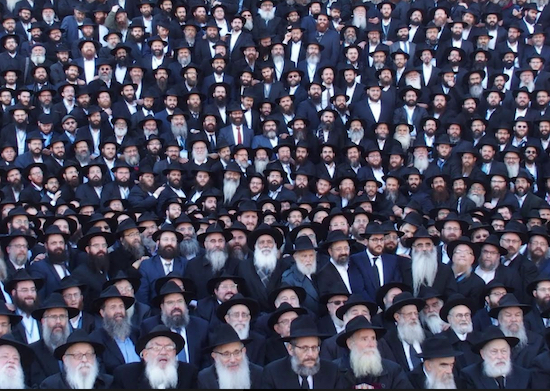The more the women, the more the witchcraft
The place of women in Pirkei Avot, and therefore within the
framework of best practice in daily Jewish life, has featured before in Avot
Today, when we discussed the extent to which a man might talk to his own, or
another’s, wife. We return to this topic with a review of two statements Hillel
makes in the first part of Avot 2:8 regarding women (I’ve put the relevant part
of the text in bold print):
מַרְבֶּה בָשָׂר מַרְבֶּה רִמָּה, מַרְבֶּה נְכָסִים
מַרְבֶּה דְאָגָה, מַרְבֶּה נָשִׁים מַרְבֶּה כְשָׁפִים, מַרְבֶּה שְׁפָחוֹת
מַרְבֶּה זִמָּה, מַרְבֶּה עֲבָדִים מַרְבֶּה גָזֵל. מַרְבֶּה תוֹרָה מַרְבֶּה חַיִּים,
מַרְבֶּה יְשִׁיבָה מַרְבֶּה חָכְמָה, מַרְבֶּה עֵצָה מַרְבֶּה תְבוּנָה, מַרְבֶּה
צְדָקָה מַרְבֶּה שָׁלוֹם...
One who increases flesh increases
worms; one who increases possessions increases worry; one who increases
wives increases witchcraft; one who increases maidservants increases sexual
immorality; one who increases manservants increases theft; one who increases
Torah increases life; one who increases study increases wisdom; one who
increases counsel increases understanding; one who increases charity increases
peace…
In this, the first of two parts of our review of this
Mishnah, we deal with wives and witchcraft. The post that follows it deals with
maidservants and sexual immorality.
While witchcraft was a matter of serious concern to the
Tannaim (see e.g. Sanhedrin 45b, where Shimon HaTzaddik arranging for the death
of 80 witches in Ashkelon), this part of the mishnah may seem irrelevant to the
contemporary reader, especially since it is directly related to polygamy, a
practice that is very much in abeyance in Jewish society (polygamy is
technically permitted by the Torah but was banned via a decree of Rabbenu
Gershom c. 1000 CE).
Leaving the issue of polygamy aside, and accepting that the practice
of witchcraft is not exclusively the prerogative of the female, we have to
recognize that in contemporary society the word “witch” is associated
principally with women. It is generally deployed as a derogatory term, often
suggesting someone who is ugly or deformed, bad tempered, more than averagely
assertive or able to get their own way. Additionally, witchcraft is not a
concept that greatly affects people’s lives in the twenty-first century.
Apart from that, there are more serious issues of
interpretation to contend with. Taken literally, the proportionality expressed
in this part of the mishnah appears to imply that there will always be some
witchcraft, irrespective of the number of wives. Further, the assessment of
“the more the wives, the more the witchcraft” does not appear to depend on the
personal qualities of the women concerned, who may be possessed of the highest
degree of integrity, morality and respect for God. Finally the Torah (Shemot
22:18) states categorically that a witch should not be allowed to live, but the
mishnah does not appear to endorse this requirement.
Some commentators leave us to form our own opinions since
they offer no comment about women and witchcraft at all (e.g. Rabbi Chaim
Volozhin (Ruach Chaim), the Chida (Chasdei Avot), the Alshich (Yarim
Moshe), Rambam and the commentary ascribed to Rashi. Others consider that Hillel
was speaking metaphorically. The most popular commentator on Avot, Rabbi
Ovadyah MiBartenura, treats the increased number of wives here as the pivotal
point in a sort of Rake’s Progress in which a man, over-indulging in food,
drink and the good things in life which affluence makes available to him,
secures many wives; each in turn needs a maidservant and they collectively
require a retinue of manservants to supply their needs. His explanation of the mishnah,
under the heading “one who increases wives increases witchcraft,” makes no mention
of witches and their craft at all. It is notable that the Tosafot Yom Tov—who
comments extensively and often critically on the Bartenura—lets this
parable-based explanation go unchallenged.
Another metaphorical and unflattering approach is to
understand “witchcraft” as the simple-mindedness of women who foolishly exceed
their domestic budget and fail to see the consequences when they pester their
husbands for unnecessary purchases (Be’ur Halachah to Mishnah Berurah
529 at ‘Ve’al yetzamtzem behotza’at Yom Tov’, cited in Rabbis Baruch and
Amos Shulem, Avot uVanim al Pirkei Avot). If this was ever the case—which
may be doubted outside the realms of popular non-Jewish fiction of bygone times—there
is no evidence that the 21st century Jewish working wife who
shoulders her share of domestic responsibility even comes close to resembling
this insulting and offensive stereotype.
A further approach is to vest this mishnah with the meaning
that, from the point of view of a husband, the experience of amassing wives feels
like an accumulation of witches. A man with many wives may absolutely fail to
understand the nature of their communications with one another, their shared
interests and their rivalries, their adoption of a scale of priorities at odds
with his own and their preoccupation with matters in which he had neither
interest nor expertise. Out of his depth in the social milieu of his harem and
unable to control collectively those over whom he wields dominance one-to-one,
he might well consider himself the victim of powers that lay beyond his understanding—this
being in effect a sort of witchcraft.
Variations on the theme of this explanation can be found in
the notion that wives, competing for the attention and the affection of the
same husband, would resort to the services of witches in order to promote their
cause (Machzor Vitry; Rabbenu Yonah) or to make themselves more
appealing (Rabbi Avraham Azulai), or that the husband, broken in mind and
exhausted in body by a surfeit of sex (Tiferet Yisrael (Yachin); Rabbi
David Sperber, Michtam leDavid), would in his desperation seek relief by
consulting the occult and illicit forces of the Ov or the Yidoni (Devarim 18:11.
Rashi explains there that the Ov is a sort of ventriloquist who projects his
voice through his armpit, while the Yidoni speaks through a bone that he places
in his mouth. Both are sorcerers, whom it is prohibited to consult).
This approach can be adopted prospectively by the man who
has yet to take on extra wives. Thus Rabbi Yechezkel Sarno (Daliyot
Yechezkel, cited in Mishel Avot) sees this Mishnah as a sort of
checklist for a man who is advancing through various stages in his life. At the
point at which he considers whether to increase the number of his wives, that
is the moment for him to imagine himself increasing not wives but witches, this
being a prophylactic against subjecting himself to the force of their
irresistibly seductive powers.
On a historical note, the Tanach has not shirked from
showing the consequences of taking more than one wife, even where the husband concerned
is a man of the highest integrity and commitment to serving God. The domestic
relationships that are a consequence of Jacob marrying sororal co-wives Rachel
and Leah is clearly strained, and King Solomon’s failure to observe the
injunction placed upon a king to limit the number of his wives led ultimately
to the royal family practicing idol worship and to national disaster.
Where then does this leave us? Among modern commentators
there is some reluctance to get tackle this issue. R’ Dan Roth (Relevance: Pirkei Avos for the
Twenty-First Century), Samson Krupnick and Morris Mandel (Torah Dynamics)
and R’ Yisroel Miller (The Wisdom of Avos) omit this mishnah in its
entirety. R’ Irving Greenberg (Sage Advice) does mention the Mishnah but
says nothing about wives and witches.
Others do discuss it but tread warily. R’ Reuven Bulka (Chapters
of the Sages), having mentioned the risk of internecine strife between
multiple wives, comments: “The quality of one true love relationship is more
meaningful and lasting than ten superficial relationships”. Gila Ross discusses
all the situations Hillel cites, using the present tense, while mentioning
wives-and-witches in the past tense—a gentle suggestion that the Tanna’s words
are of purely historical interest.
R’ Yaakov Hillel (Eternal Ethics from Sinai), seizes
the opportunity this mishnah offers him to embark in a lengthy discussion of some
key issues. He writes of the need for moderation in all things, the priority of
the spiritual over the physical and the dangers of excessive wealth and the
need to regard life as more than merely a vehicle for physical pleasure: he
also cautions that a man who cannot satisfy his lusts will be buried by them.
Ultimately, however, he endorses the 500-year old metaphor of the Bartenura
since, taken as a whole, it comes closest to addressing the need of our times.
I’d be curious to know what readers think. Please share your
thoughts with us.
Comments and discussions on this post are on its Facebook page here.














